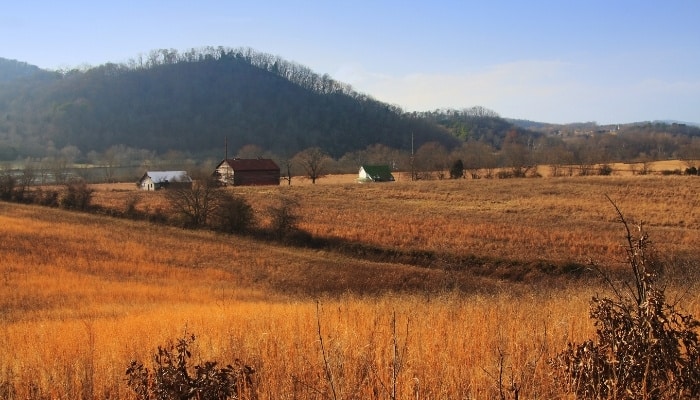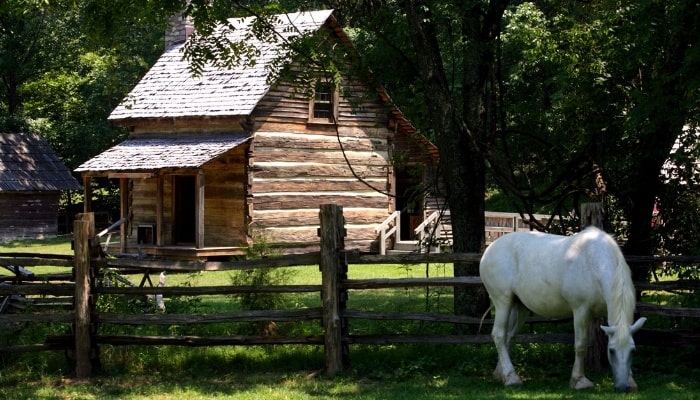Tennessee, also known as “The Volunteer State,” is renowned for its hospitable and amiable residents, much like its beloved Dolly Parton.
But what are the realities of living in Tennessee as a wannabe homesteader in terms of land costs, raising a family, growing crops, and more?
Is Tennessee a good state for homesteading? For potential homesteaders, Tennessee offers many advantages, such as no income tax, low cost of living, and affordable land. Its mild climate also provides a long growing season for crops while higher-than-average rainfall provides a reliable off-grid water source.
Due to steep prices and high crime rates, places like Nashville, Knoxville, and Memphis are best avoided – otherwise Tennessee is a swell state for homesteading!
We’ll explore everything you need to know about starting a homestead in Tennessee from land laws to homeschooling and more, including our top tips to consider before taking the plunge.
Homesteading in Tennessee
There’s a lot to love about Tennessee — just make sure you know your legal onions before you start growing any (and more besides!). Let’s look at the laws regarding zoning, food selling, the price of land, and more.
Tennessee Homestead Laws
Homestead laws in Tennessee aim to encourage the heritage of family land, even in difficult circumstances. So, according to current Tennessee statute, residents facing financial hardship will not have to give up their entire property to creditors in the event of a non-payment of debts.
Under Section 26-3-201 of the Tennessee code, property owners may designate up to $5,000 worth of their property as a homestead (or a max value of up to $7,500 if more than one debtor is involved).
NOTE: The property being vouched for as a “homestead” must be occupied by a member of the owner’s immediate family (this could be the owner themselves, the owner’s spouse, or their dependant).
Tennessee Livestock Laws
Under Section 44-8-401 of the Animals & Animal Husbandry code in Tennessee, it is “unlawful for the owners of any livestock to wilfully allow livestock to run at large in TN,” and violation of this law carries a Class C misdemeanor (fines and/or jail time up to 1 year).
For clarification on the definition of livestock, Section 39-14-201 of the TN code classes “all equine and animals being raised for use as food, or fiber for human utilization or consumption.”
Further regulations regarding livestock and other non-livestock animals on the property can be viewed here, including health regulations for fairs, exotic pet licenses, etc.
Tennessee Zoning Laws
Compared to some states, Tennessee’s zoning laws and restrictions are relatively casual. According to homesteader Camden Benoit of the blog Sustainably Off-Grid, “most parts of TN have no zoning restrictions and much of the land is categorized under “Rural” or “Agricultural.”
The only places you can expect some zoning issues and limitations are in urban regions or conservation areas.”
Tennessee Cottage Food Laws
According to the Institute for Justice, producers of cottage food (any food made in a home kitchen for sale) are permitted to sell any non-potentially hazardous foods. Here’s a list of the current cottage food laws:
Happily, the laws concerning sales and cottage food venues are very relaxed, and Tennessee food producers can enjoy no limit on their annual sales cap and no restrictions as to where they can sell their homemade food direct to consumers.
You can find further info here regarding permitted venues/services for selling food, labeling suggestions, etc.
Tennessee Homestead Exemption
If you file for bankruptcy, Tennessee’s Homestead Exemption allows you to protect some of your home’s equity.
You can do this by supplementing Tennessee’s state bankruptcy exemptions with federal nonbankruptcy exemptions, and you may be able to increase your exemptions if you are married, over 62 years old, or have a dependent.
The baseline homestead exemption amount is up to $5,000, but this can increase to $7,500 for a joint bankruptcy filing with a co-owning spouse, 12,500 for an individual of 62+ filing; $25,000 if filing with a minor dependant child in the household, etc.
Read full details of the Homestead Exemption here.
Tennessee Gun Laws
- As of July 2021, residents of Tennessee who are at least 21 years or older do not require a permit to carry a firearm (whether open or concealed) according to the Sevier County Sheriff’s Office, Sevierville, TN.
- There is no background check, permit, or firearms registration required when buying a handgun from a private individual.
- In regards to defense of property, property owners are justified in using nondeadly force or threatening another when deemed necessary to prevent trespassing or interference with personal property, according to the USCCA.
Available Land in Tennessee
According to data collected by Land Watch, Tennessee has $9 billion of farms, ranches, and land parcels listed with over 22,000 properties currently listed on Land Watch.
Tennessee Land by Region
(Currently available on Land Watch as of September 2022)
Eastern TN: 11,000+
East central TN: 6,900+
West TN: 2,900+
West Central TN: 1,000+
Land ranges from undeveloped and timberland sites to lakefront, horse, and home-site properties, and acreage range from 0.06 up to over 8,000 acres.
There are also hundreds of popular off-grid listings for sale at Land and Farm and Land Search.

Tennessee Land Prices
Land prices are comparatively low in Tennessee next to some states, but this depends on where you plan to buy – land in Nashville can be in the millions!
According to Land Watch, the average price of land parcels in Tennessee is around $395,759, and property tax in the state is around 0.74 percent with the highest in Robertston County (0.754 percent), which is 30 miles from Nashville.
Tennessee Climate
You’ll experience all four seasons in Tennessee with true-to-summer heat and humidity, although winters are relatively mild.
Grow Zones in Tennessee include:
- 5a
- 5b
- 6a
- 6b
- 7a
- 7b
- 8a
The average temperatures for each season are as follows…
The Volunteer state receives around 50 inches of annual rainfall (20 inches more than the national average) and between 5 inches of snowfall in the wast and 16 or more inches in the east and mountain regions.
On average, the last frost dates in Tennessee tend to be between April 1st and 30th but can be as early as March 1st–30th in certain regions of western TN or as late as May 1st-15th in certain eastern areas.
The first frost dates in the state are roughly between October 16th and 31st but can be the first week of October in easter regions and November in western regions.
Tennessee Growing Season
The length of growing seasons in Tennessee can vary depending on the region. Residents in western Tennessee may enjoy an 8-month growing season while those in eastern areas may only have a 5- or 6-month-long growing season.
Number of Homesteaders in Tennessee
The exact number of homesteaders is not known, but over 40 percent of Tennessee’s total land is used for farmland, with 69,000 farms recognized in total, according to the Tennesee Farm Bureau Federation.
Is Tennessee Good for Off-Grid Living?
Yes, Tennessee is a state very well suited to off-grid living thanks to affordable living costs and little to no off-grid restrictions.
The generous annual rainfall makes it easy to gather water (which is often preferable to freshwater sources as the density of animal farms can contaminate the groundwater quite quickly).
As for off-grid power, you can affordably install solar power systems by applying for a 30% federal tax credit or install wind power systems with the help of rebates and local incentives.
NOTE: Those unsuited to a humid climate, such as those with respiratory conditions, may find off-grid living difficult to bear in Tennessee unless you live closer to mountainous regions such as the Blue Ridge/Great Smoky Mountains.
Can You Homeschool in Tennessee?
Absolutely! According to the Tennessee Department of Education, parents or legal guardians in TN have the option to homeschool their children in kindergarten through 12th grade.
Homeschooling in Tennessee can be done in one of the following ways:
- Independent or traditional homeschooling (privately at home, maintaining regular contact with the local school district regarding pupil health, proposed curriculum, etc.)
- Homeschooling through an umbrella church-related school
- Homeschooling via an accredited online distance-learning school
Helpful information on each homeschooling type can be found here.
How To Find Land for Homesteading in Tennessee
Start by making a simple list of your criteria (max price, acreage, purpose, etc.). Next, narrow down a county/region to begin your search (perhaps you already have one in mind?).
Check out sites like Zillow, Land and Farm, and Land Watch to hone in on your ideal plot of land. While on the hunt, it can’t hurt to join homesteading forums and online groups in the region you’re interested in to spread the word about your search.
Dave Wortman from Mother Earth News also advises not ruling out abandoned farms and contacting your local BLM (Bureau of Land Management) office about sourcing federal land.
5 Tips for Homesteading in Tennessee
- Take a trip: The best way to get an idea of life in your preferred TN region is to explore the area, the culture, and the food and get to know the locals – your best resource in the area!
- Lease your property for a few months before buying. This’ll help give you a feel for the land and what you can afford to do with it (machinery, equipment, livestock expense, etc.) before committing.
- Ensure you have at least 6 months of savings.
- Learn food preservation skills like canning, pickling, etc.
- Consider solar power options.
List of Helpful Resources
- Tennessee Homesteading group – Facebook
- East Tennessee Homesteading group – Facebook
- Homesteading in TN, Personal Story – The Tennessean
- 2021 Homesteaders of America (Tennessee) – YouTube
- Homesteading in Tennessee – Reddit group
- Homesteading Tennessee – Bush Craft USA forum
- Beginner Farmer Resources – Dept. of Agriculture
- How to Start a Homestead with Little Money (Homesteading for Beginners) – Tennessee Homestead
- Tennessee – Homesteading Today forum
- Homesteading Communities, TN – City-data
Related Questions:
Is There Free Land in Tennessee?
There is currently no free land available in TN, but homesteaders can purchase land across the state of various acre sizes and for different purposes.
The Lincoln-enacted 1862 Homesteading Act – granting free land to families for a minimal filing fee – was repealed in 1976 by the Federal Land Policy & Management Act.
Is Hunting Good in Tennessee?
Yes, Tennessee is considered a reasonable hunting state as non-residents have access to plenty of public ground with good deer numbers (specifically red and white-tailed deer). There are small and big-game opportunities including black bears, wild hogs, elk, raccoons, turkeys, ducks, and geese.
Conclusion
To sum up, the friendly state of Tennessee is home to relatively affordable land and a cheap cost of living, making it ideal for homesteaders.
Its four-season climate and lengthy growing season are great news for growing a wide variety of crops, and the mild winters and pleasant environment make Tennessee a great state to live off-grid too!

